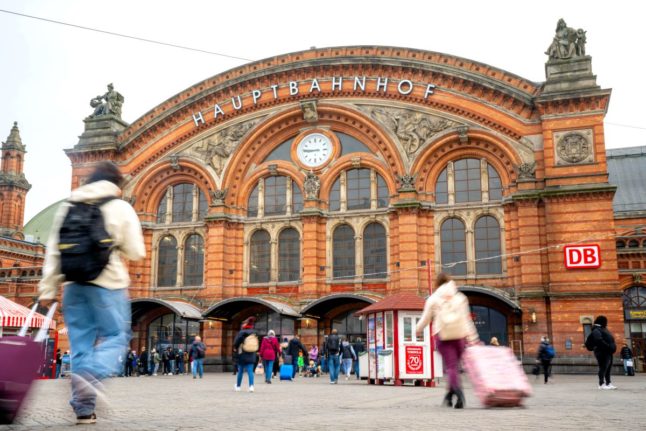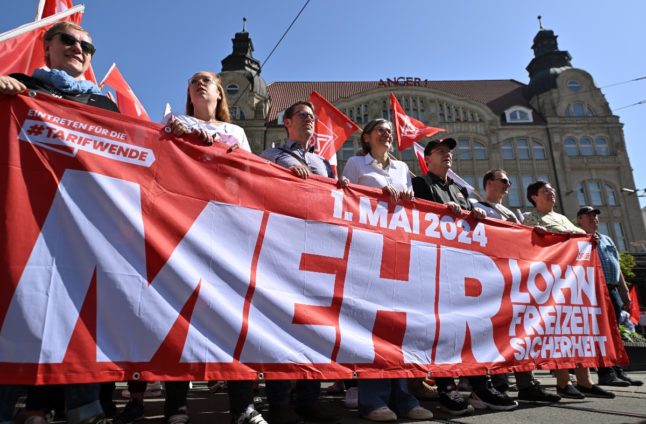Bayer Leverkusen win first Bundesliga title
Bayer Leverkusen lifted the Bundesliga title for the first time in their 120-year history on Sunday with a 5-0 victory over Werder Bremen, breaking Bayern Munich’s 11-year stranglehold on the German top flight.
Xabi Alonso’s Leverkusen knew victory would secure the title with five games to spare, and there were no signs of nerves in a dominant performance.
A hat-trick from Florian Wirtz and goals from Victor Boniface and Granit Xhaka extended their unbeaten run to a stunning 43 games in all competitions.
Incredible scenes as Bayern Leverkusen win the German League for the first time ever in their 120-year history.
They also ended Bayern Munich’s run of 11 consecutive league titles.pic.twitter.com/dsuUWm4NsI
— Tanay Jaipuria (@tanayj) April 15, 2024
Leverkusen’s maiden title, coming after five second-place finishes in their history, keeps their dream of a remarkable treble alive while shedding their unwanted ‘Neverkusen’ nickname for good.
Scholz walks tightrope on trade and politics in China
German Chancellor Olaf Scholz arrived in China on Sunday, kicking off a trip in which he faces a tough balancing act as he aims to shore up economic ties with Berlin’s biggest trading partner. Scholz touched down in the southwestern megacity of Chongqing on Sunday morning, Chinese state broadcaster CCTV said, accompanied by a large delegation of ministers and business executives.
As Western allies are cranking up pressure on Beijing, Scholz is expected to underline that Germany remains committed to doing business with the world’s second-largest economy and rejects US-led calls for “decoupling”.
His friendly overtures towards China risk sparking ire among Washington and EU partners, which have been pushing back against Beijing’s heavy subsidies for industries.
Record number of people travelled by rail in Germany in 2023
Rail passenger figures in Germany have recovered from the Covid-19-driven slump, with a record number of people travelling by train in 2023 despite strikes, construction work and delays.
“We complain, but we travel by train,” the head of the Allianz pro Schiene transport association, Dirk Flege, told German press agency DPA.
The alliance reported a record for 2023: 104.2 billion passenger kilometres compared with the previous record of 102 billion passenger kilometres achieved in 2019. These figures are obtained by multiplying the number of passengers travelling by train by the distance they travelled.
READ ALSO: Record number of people travelled by rail in Germany in 2023
Police shut down pro-Palestinian conference in Berlin
Police interrupted and cancelled a controversial pro-Palestinian conference in Berlin less than an hour after it started on Friday, citing concerns about anti-Semitic statements.
Officers initially halted the congress because one of the speakers was subject to a ban on political activity in Germany, police wrote on X, formerly Twitter.
Police did not give the name of the speaker, but participants in the congress wrote on X that it was Palestinian researcher Salman Abu Sitta. Police then later wrote on X that they had banned the remainder of the conference, which was due to last until Sunday.
READ ALSO: Police ban pro-Palestinian congress in Berlin
Lufthansa suspends flights amid Middle East tension
Lufthansa has suspended until at least Monday its flights to and from Tel Aviv in Israel, Amman in Jordan, as well as Erbil in Iraqi Kurdistan, a spokesman said on Sunday.
Following Iran’s unprecedented attack on Israel, the German airline is “constantly monitoring the situation in the Middle East”, a spokesman told AFP.
Flights to and from Beirut and Tehran will remain suspended until at least April 18th, as announced on Friday, he said.
The Lufthansa group, which also includes SWISS and Austrian Airlines, said it would also make sure its flights did not use the airspace above Israel, Jordan and Iraq for the foreseeable future.




 Please whitelist us to continue reading.
Please whitelist us to continue reading.
Member comments